Dear all:
Please use the comments section here to post your responses to Estrella’s questions from her class last Thursday. Once we compile your responses we will send it to Estrella all together.
All best,
Sujit.
Global Communities of Practice
Luce Seminars at Emory University
Dear all:
Please use the comments section here to post your responses to Estrella’s questions from her class last Thursday. Once we compile your responses we will send it to Estrella all together.
All best,
Sujit.
October 31, 2018:
Guest speaker: Sundeep Narwani, political activist with the Aam Aadmi Party (AAP) in Delhi, secretary of the AAP Jhuggi Jhopri (shanty homes) cell. Sundeep has been involved in issues of urban politics, infrastructure, and issues of justice in relation to access to municipal and other services for marginalized urban groups in Delhi.
Readings:
** we got the following note from our guest speaker late last week. Please don’t feel pressured to read all of the recommended materials, but please do take a look at some of them to familiarize yourself with some of the broader frameworks that Mr. Narwani will be referring to in his presentation.**
The following materials are recommended by our guest Sundeep Narwani, who writes:
Supplemental readings (assigned earlier):
https://www.newslaundry.com/2016/12/10/delhis-urban-poor-crushed-between-dda-and-landowners
November 1, 2018:
Guest Speaker: Brother Haroun from the Streetgroomers (http://streetgroomers.org/)
Video clips:
Our guest Brother Haroun wants us to take a look at the following short video clips:
Readings:
This week marked The Guardian’s Atlanta Week, and we wanted to share some of these articles that have been published over the last few days. If you want to learn more about Atlanta Week, you can follow this link here: (https://www.theguardian.com/cities/2018/oct/22/what-is-guardian-atlanta-week-and-how-can-you-get-involved)
https://www.theguardian.com/cities/2018/oct/25/cursed-sprawl-can-beltline-save-atlanta
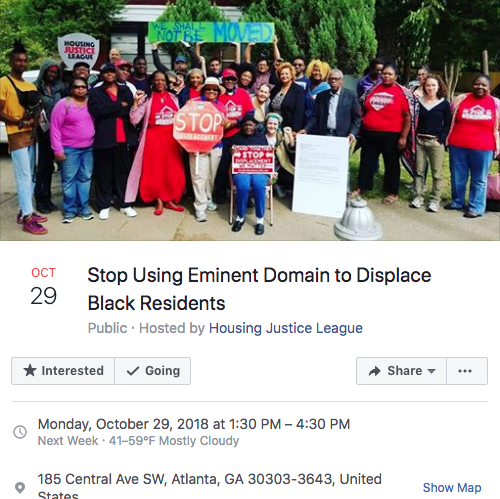
** the following details have been pulled from the social media post by the Housing Justice League **
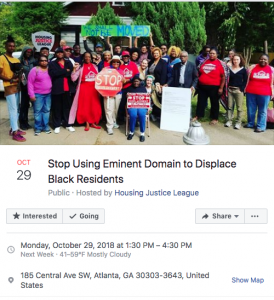
October 29: Stop Using Eminent Domain to Displace Black Residents
Peoplestown Residents Return to Court To Prove City’s Fraudulent Use of Eminent Domain in Peoplestown
Date: Monday October 29, 2018
Time: 1:45 p.m.
Location: Fulton County Superior Court/ 185 Central Ave SW/ Atlanta, GA 30303
Peoplestown residents return to court after Judge Schwall directed the City to bring former city engineer working on the proposed park/pond project to testify as to whether the houses that have been taken by the City were necessary for the plan. Emails authored by this engineer noting “no technical data” supporting the City’s proposed project, motivated Judge Schwall at an August 5, 2018 hearing to schedule another hearing to further consider the City’s motives for taking property in Peoplestown.
Resident Tanya Washington, the subject of the hearing, and her neighbors on the block have been targeted by the City for the past 5 years to take their homes to build a park, pond, waterfall and large gazebo. The City has maintained that it needs every home on the block to address flooding in the neighborhood. However, at a previous hearing the City’s star witness, Department of Watershed engineer Todd Hill was presented with a 2013 email by an engineer from his office that communicated that the flooding could be addressed without the block. In response to a direct question from Judge Schwall about the veracity of the document, Todd Hill testified, “I don’t know.” The hearing on Oct. 29 will reveal once and for all that this property was not necessary for the proposed project. Unfortunately, the truth will be too late for the 22 homes that have been demolished and the families forced to move at the direction of the City of Atlanta.
The outcome in this case will create precedence that will either protect residents against these types of land grabs by the City using eminent domain or it will give the green light to city officials, authorizing them to steal peoples’ homes under fraudulent pretenses. Resident Washington said, “I do not intend for my name to be in the caption of a case that is used to displace people in Atlanta. Five and a half years of my life has been consumed by this fight with my neighbors to defend our property against unlawful taking by the City of Atlanta. We will fight this until the bitter end!” In light of the Atlanta’s reputation as the City with the most economic inequality between the haves and the have nots, the dearth of affordable housing in the City and the rapid gentrification of Atlanta neighborhoods, this case is particularly timely and important.
Please use the following link to access the video recording of this session at the Atlanta University Center (AUC). This event was organized by our partners at Spelman College as part of the intercampus seminar series on ‘the practice of democracy’. The title for this session was: “The mid-term elections: AUC edition”.
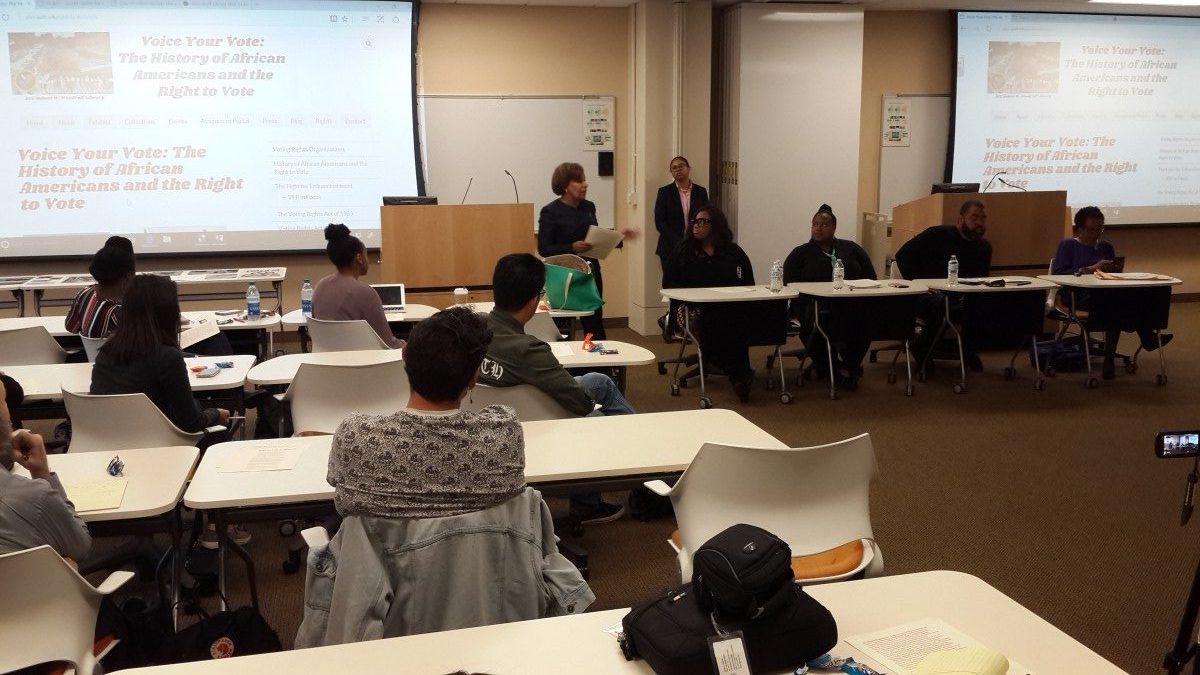
Intercampus event at the Atlanta University Center (AUC) organized by members at Spelman College. October 24, 2018.
Event: Eighth session of the inter-campus seminar series on ‘the practice of democracy’
Session Topic: “The mid-term elections: AUC edition”
Where: Atlanta University Center, Room 202, Robert W. Woodruff Library, located at 111 James P. Brawley Dr. SW, Atlanta, GA 30314
When: October 24, Wednesday, 5:30 – 7:00 pm
**Please see attached program flyer for more details**
Dear all:
Members of the intercampus serminar series on ‘the practice of democracy’ at Spelman College are partnering with the Atlanta University Center (AUC) to host the eighth session of the seminar series titled, “The mid-term elections: AUC edition” on October 24, Wednesday, from 5:30 – 7:00 pm.
The event will take place at the Atlanta University Center (Room 202, Robert W. Woodruff Library) located at 111 James P. Brawley Dr. SW, Atlanta, GA 30314 . This is a public event and we urge faculty members as well as undergraduate and graduate students to attend. Please refer to the updated program flyer for a list of speakers and other details about the event.
We look forward to seeing you then!
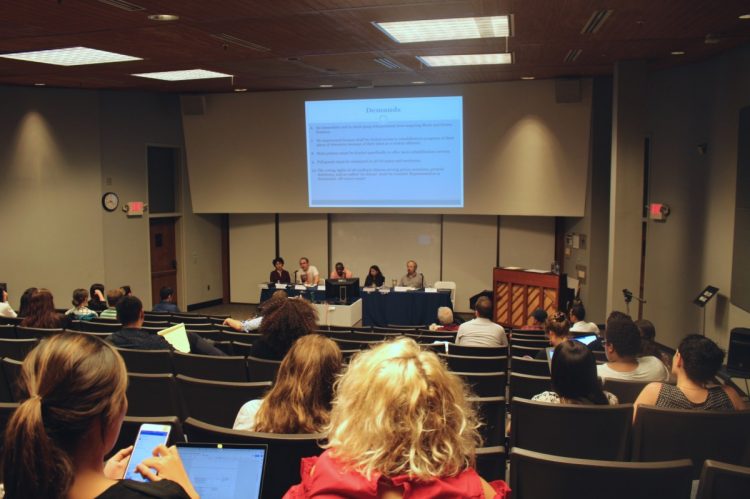
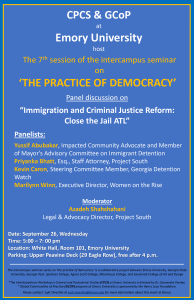
Please follow this link to access the video recording of this session:
https://www.youtube.com/watch?v=Vz1OmwILj4M&feature=youtu.be
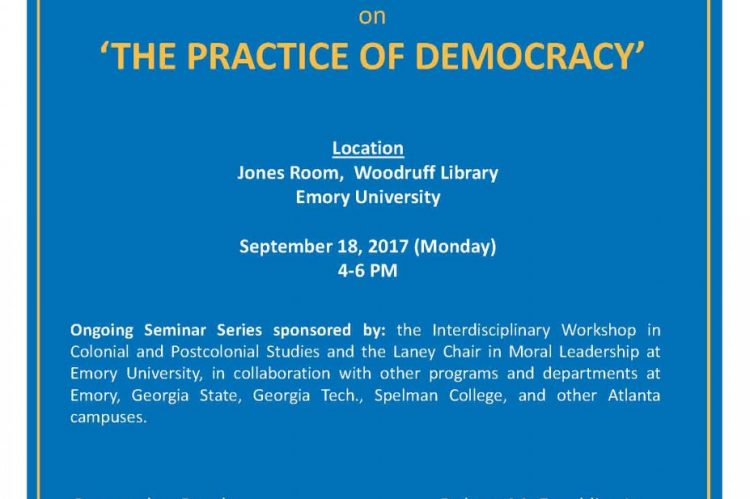
The inaugural session of the Inter-campus Seminar Series on the “Practice of Democracy” was held at Emory University on September 18, 2017. Our first public circulation advertising our inaugural event outlined the purpose of the seminar series as follows:
“The idea of the seminar is for interested faculty and graduate students from different schools in Atlanta – Emory, Georgia Tech, Georgia State, Atlanta University and possibly other campuses – to meet monthly, with a different institution hosting each month. Our aim is to build a wide-ranging conversation on the practice and future of democracy, and the role of academics in promoting the flow of reliable information and healthy intellectual and political debate. For each session, we will invite a speaker from the local academic and intellectual community (or from outside Atlanta, especially when an interesting visitor is available) to present a research paper or talk in an area of her/his expertise, with perhaps one or two discussants responding briefly to initiate what we hope will be an engaged and ongoing discussion.”
Following the inaugural session at Emory University in September, 2017, our partner institutions have organized five other sessions at various campuses including Georgia State University, Georgia Tech., Spelman College, and Agnes Scott College.
Dr. Gyanendra Pandey is the director of this seminar series. Dr. Sujit Shrestha is the coordinator at Emory University. Our steering committee consists of members from our partner institutions.
Event posters for each of our sessions containing additional information about specific session themes and speakers can be found here.
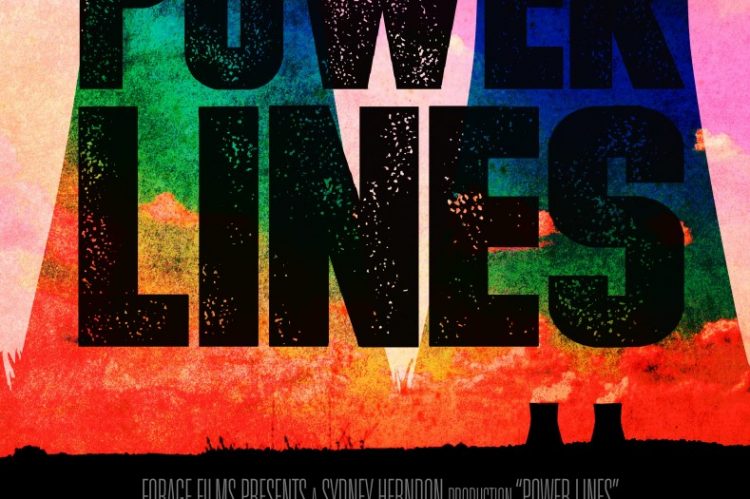
Emory University’s Center for Ethics will host the debut screening of Forage Films’ short documentary Power Lines, chronicling the addition of two new nuclear reactors at Plant Vogtle, located in Waynesboro, Georgia. The screening will take place on October 25th at 7:00 PM.
The film follows the construction of these new units, which are already five years behind schedule and more than $13 billion over original cost estimates. These overages directly affect ratepayers across Georgia, who are financing the construction through a fee on their monthly power bills, a process fraught with mismanagement and lacking in transparency. These ratepayer payments significantly enrich Georgia
Power’s yearly profits, giving them little incentive to ensure the project’s timely completion.
Power Lines also sheds light on the even more dire significance Plant Vogtle holds for the surrounding communities in Waynesboro, Georgia. While residents recognize the potential economic opportunity the additional reactors offer (over 40% of the population lives below the poverty line), they also bring significant environmental and health hazards, not to mention grave concerns surrounding serious flaws in their design.
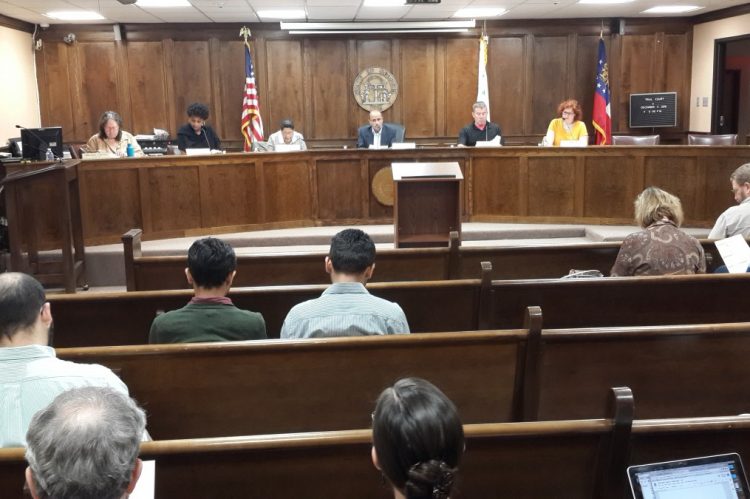
We would like to thank Mr. Birendra Dhakal, the chair of the Planning and Zoning Committee in the city of Clarkston for inviting our class to attend the meeting in the Clarkston City Council Hall on October 16, 2018.